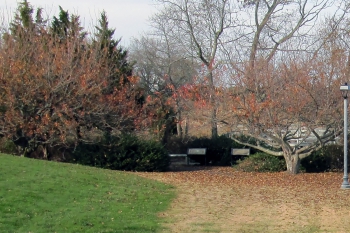
Simplicity is a beautiful thing, but you won't find it among ice- and snow-removal products. A bewildering array of ingredients pop out of these bags when we're on that mad dash down the driveway.
Unfortunately, products that increase sidewalk safety for people may not be safe for the lawn or garden. In the picture on the right, grass was damaged when snow laden with ice-melt products was moved from a parking lot to a lawn.
How concerned do you need to be? Academic studies show that Kentucky bluegrass, one of the most common lawn grasses in North America, is highly susceptible to salt damage. Fescue, another common lawn grass, is only moderately tolerant of salt.
The good news for lawns and gardens, if there is any, is that spring rainfall dilutes the effects. Also, the problem doesn't affect all plants equally; some are far more susceptible than others. It is hard to find lists of "plant-safe" ice melt products, but read on, there are three rules of thumb that will help avoid plant damage in my article in The Day/Zip06. Please download the PDF at the end of this page.
| Attachment | Size |
|---|---|
| 121.79 KB |
